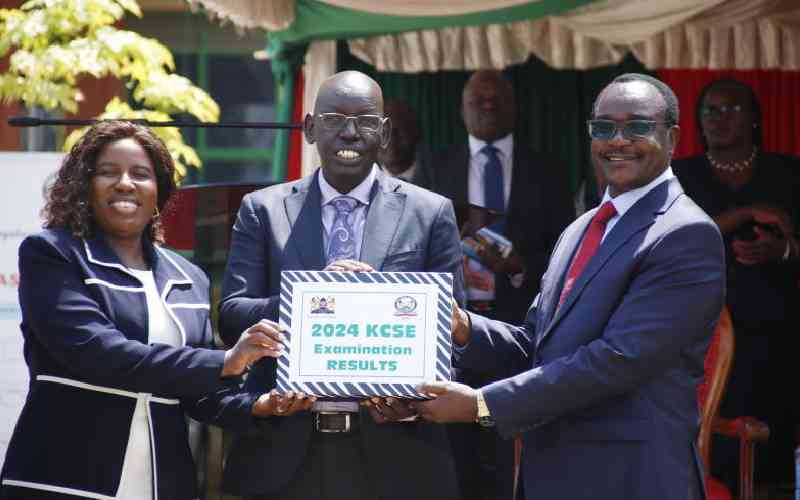
Thousands of students from vulnerable backgrounds across Kenya are unable to collect their KCSE certificates or result slips due to unpaid school fees.
This critical document is key to higher education, job opportunities, or even joining vocational training programs. Yet, for many, they remain locked away in school offices.
Without their certificates, students cannot apply for Higher Education Loans Board (HELB) funding or be placed in universities and Technical and Vocational Education and Training (TVET) institutions. For some, it’s a dead end.
At just 18, Veronika Mwalokanga should be preparing to join university in April. Instead, she sits at home in Matuga, her dreams deferred, unable to collect her KCSE certificate due to a Sh50,000 school fees balance.
“She did everything right—worked hard, passed her exams—but now she cannot move forward,” says National Parents Association Chairman Silas Obuhatsa. “This is not just unfair, it’s tragic.”
Mwalokanga is just one among thousands of students across Kenya who find themselves locked out of opportunities — not because they failed, but because they can’t afford to pay off school fees arrears.
In essence, the students ambitions are held hostage by the very institutions meant to empower them.
Seventeen-year-old Akelo not her real name made the journey from Nairobi’s Mlango Kubwa to Muhudu Secondary in Vihiga, hoping to collect her certificate.
“I cleared with my teachers, but when I reached the principal’s office, he sent me away. He didn’t even listen. ‘I want zero balance for the certificate’,” she says quietly.
Another student, who had received admission to study Electrical Engineering at a local college, lost the chance after she failed to submit her documents in time.
“I was forced to borrow money from friends to try and clear the fee balance. But by the time I raised it, the deadline had passed. That chance is gone,” she recalls.
Nancy Nyambura, a widow in Nairobi, is still haunted after her son lost a chance at the National Youth Service, due to challenges in accessing his KCSE certificate.
“I begged the school to let him go with a payment plan for the Sh18,000 balance. The principal said no. We lost the opportunity,” she says.
This is happening as students fight to beat the deadline of applying for courses in higher learning institutions.
Stay informed. Subscribe to our newsletter
Kenya Universities and Colleges Central Placement Service (Kuccps) opened the portal this week for learners to choose their preferred courses.
National Parents Association Chairman Obuhatsa says he has heard too many stories of broken dreams.
“Some parents have died without ever seeing the result of what they sacrificed for. We’re holding futures hostage over money — money these families don’t have,” he says.
Obuhatsa says they are dealing with cases where schools are still holding certificates from as far back as 2001.
“Imagine — twenty years later, someone’s life is still on pause,” he adds.
Education Cabinet Secretary Julius Ogamba recently directed schools to release all withheld certificates within 14 days.
The CS noted that the law is clear that no school is allowed to withhold a student’s certificate. Yet, enforcement has remained elusive.
“No certificate of any student should be held by any institution or individual for any reason,” he declared.
He pointed out that the certificates are issued by the Kenya National Examinations Council (KNEC), not the schools, and therefore no one has the authority to hold them.
“The heads that withhold certificates are transforming them from evidence of achievement into collateral — and that’s unacceptable,” Ogamba said.
But this isn’t the first time such an order has been given. MPs, like Tinderet’s Julius Melly, are skeptical:
“What makes this directive any different from the others that were ignored?”
The CS noted that the government is rooting for a way that certificates will be distributed through sub-county offices to prevent further abuses — a system that has been proposed before but never effectively implemented.
Former Kenya Secondary School Heads Association (KESSHA) chairman Kahi Indimuli agrees that the practice is morally and legally wrong.
“There’s no contract where a student offers up their certificate as collateral. You’re punishing children for being poor,” he said.
“A certificate should open doors, not close them. When schools hold them back, they reinforce inequality and rob families of hope,” he adds.
Obuhatsa says the psychological toll on students is devastating. “Some are depressed, some hopeless, some even suicidal. We’re killing potential.”
He recounts one case from 2019, where a student is still stuck at home over a Sh5,000 debt. “Sh5,000 that’s what’s standing between him and the future.”
Kabuchai MP Majimbo Kalasinga slammed schools who holding students’ certificates saying it was derailing their academic progress.
“The moment you hold on to the certificate, you keep the learner's life static and hostage. Release the certificate and allow them to continue with their lives. Every time a certificate sits in an office drawer, someone’s life is on hold,” he says.
“As long as it's a public day secondary school, please release the certificates so that students can continue with their lives, they will one day come back to thank you when they are successful in life," he adds.